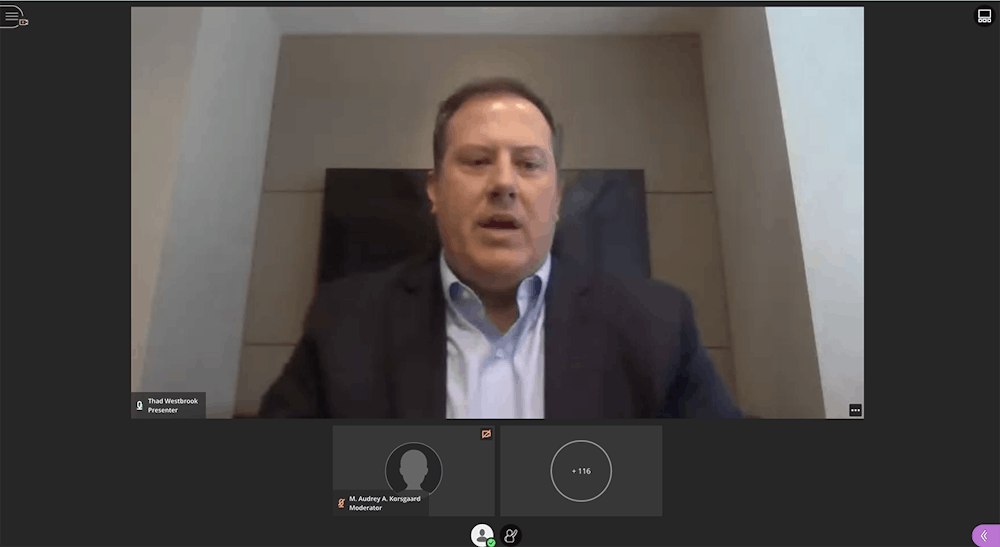The Faculty Senate discussed interviewing candidates in the ongoing presidential search, assembling a mental health task force and issues involving faculty misconduct investigations in a virtual meeting on Wednesday.
The Presidential Candidate Search Committee has been working for the past two months to build and finalize an applicant pool meeting the criteria and characteristics the committee set forth in the leadership profile it released in early September.
The leadership profile requirements include previous success leading complex organizations, fundraising success, integrity and sound judgment, eagerness to communicate and many more, according to Thad Westbrook, Vice-Chair of the Board of Trustees and Chair of the Presidential Candidate Search Committee.
"We have actually exceeded the number of applicants that we expected to receive from when we first started talking about our search. It is a very high-quality pool. It is a diverse pool. And it's one that I think the committee is very pleased with" Westbrook said.
The committee is meeting this Friday to start the process of sifting through the individuals and pulling those they choose to interview. Once candidates are chosen, the committee hopes to conduct in-person interviews before Thanksgiving; however, nothing is set to date, according to Westbrook.
Provost Stephen Cutler said USC was able to get an endowed chair from United Nations Educational, Scientific and Cultural Organization. This makes USC the 22nd holder of a UNESCO Chair in the U.S., specifically focused on data, media and our society.
UNESCO is a United Nations subcategory focusing on curating an equitable environment and accessible education.
"We hosted a forum that was on international media, freedom of the press, disinformation and hunger," Cutler said.
Cutler also said mental health on campus is a "major concern" to him. He proposed assembling a task force, which will be led by Sandra Kelly, a professor in the psychology department, and Tracey Weldon-Stewart, the associate dean for diversity and inclusion.
"One of the things I'm very interested in doing is expanding our resources here, so I plan on doing what I can to leverage those resources and improve what we do at our university," Cutler said. "This includes assembling a task force."
The Faculty Senate Information Technology Committee also presented, voted on and passed a resolution to support the funding of the Learning, Innovate, Teach and Enhance Initiative.
Scott Phinney, co-chair of The Faculty Senate Information Technology Committee, outlined the proposed LITE Initiative in two parts. The first part is providing new technology for classrooms, with hopes of reaching 500 classrooms in 5 years.
The second part is new IT zoning laid out across campus. The goal of the new zoning for IT is to make technology help quicker and more accessible to students and faculty who have been struggling through virtual learning.
Jeff Hostilo, the Executive Director of Teaching and Learning Technologies, Division of Information Technology, added that the initiative aims to be all-inclusive and provide "anytime, anywhere construction."
"We wanted to make sure that we brought that capability into the space, and that any classroom technology renovations going forward would include technologies to accommodate multi-modalities and be able to reach those remote students as well as provide quality recordings of the class sessions," Hostilo said.
Faculty Senate Chair Audrey Korsgaard, who read the proposed resolution, said the proposed LITE Initiative is one that acknowledges the importance of technology in learning and education.
Korsgaard then delivered the 'Report of Chair,' where she discussed three components regarding faculty professional conduct. She said the goal is to tighten up and define issues like bullying, or interpersonal professional conduct, in the faculty manual and revise issues of investigation and how those issues are handled.
"We've been working on more precisely defining that type of behavior in the faculty manual and the role of faculty in the investigation and communication of violations of our standards," said Korsgaard.
According to Korsgaard, drafts of these documents defining faculty misconduct will hopefully be drafted by the end of the semester.
"We may need to have a called meeting for this," Korsgaard said.
The Faculty Senate meets again on Dec. 1.

